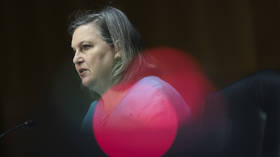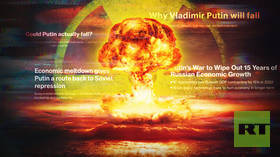Why the EU could be the biggest loser from the Ukraine conflict — RT World News

As alarm bells ring in the West, Emmanuel Macron's talk about NATO forces in Ukraine reflects a fear of failure
French President Emmanuel Macron admitted that the Fifth Republic will not send its troops to Ukraine in the near future. It was reported earlier that Western leaders discussed the issue but failed to reach an agreement.
The development of the Ukrainian crisis had contradictory consequences. Two years after the most intense phase began, Western Europe finds itself at the forefront of the confrontation. Not just in terms of the costs incurred, which were discussed from the beginning. Now the possibility of military conflict with Russia was being raised much louder in the Old World than on the other side of the Atlantic, and France was the instigator. Macron's statement about the possibility of sending NATO forces to the war zone seemed spontaneous to many. But a week later, Paris insisted it was deliberate and well thought out.
For many years, France has been calling on the European Union to think about it “strategic independence” But few expected this version to be achieved. On the other hand, if autonomy is indeed the goal, what does it mean today? Breaking away from the main ally (the United States) in the context of an acute military and political confrontation that requires its strengthening is absurd. Thus, it may mean the ability to go it alone in determining military and political tasks. To lead the new world, not the other way around.
We remember a campaign that took place 13 years ago, when the initiative for NATO intervention in the civil war in Libya came from the Western Europeans, especially the French. Their motives were interpreted in different ways at the time – from the purely personal reasons of President Nicolas Sarkozy (rumors about his financial and political ties with Muammar Gaddafi have long circulated) to the desire to achieve an easy victory over a weak enemy for the sake of achieving victory. To enhance public prestige and influence in Africa. In London (David Cameron) and Rome (Silvio Berlusconi) there was a similar echo. US President Barack Obama, who was not a military man, unlike most of his predecessors, was not enthusiastic about intervention. Amazing formula of “Leading from behind” It appeared – Washington supported its allies, but allowed them to make the decision.
The United States could not sit idly by while the situation began to resemble not the spectacular success achieved by NATO, but rather the Suez Crisis of 1956. At that time, Paris and London also tried to act at their own peril to reverse the loss of prestige among the divided colonial empires. But instead, the last page of the colonial chapter was turned, and not only the Soviet Union, but also the United States, failed to achieve its goals. Both new superpowers thought it was time for the old nobles to retire.
In Libya, the failure of the European allies was unfortunate for Washington, so it had to intervene. The result is well known – they got what they wanted (the regime was overthrown, Gaddafi was brutally killed), but at the cost of the collapse of the country and the emergence of a new center of chronic instability.
There is no point in comparing that situation with the current situation, because the structure and size are different. But militancy exists in Western Europe, for reasons that are not entirely clear. And now, as it turns out, even in Germany, which has preferred to keep a low profile regarding Iraq and Libya.
Where does this fear come from? The previously ongoing spell appears aimed at preventing NATO from being drawn into a direct nuclear conflict with Russia. And now, suddenly, Paris is speaking “Strategic ambiguity” About a cunning game to confuse Russian President Vladimir Putin and make him afraid to make his own decisions because of the potentially irreversible consequences. Let him fear the next steps, not us.
This has not yet been repeated in other major capitals, but a group of countries ready to clash with Moscow has begun to form.
Ambiguity is a familiar theme, and Russia is no stranger to it in this campaign. From the beginning, Moscow's goals were more descriptive than concrete, and they still are. When the issue of border movement is raised publicly from the highest pulpits, Europeans who have fought each other for centuries on the basis of this same movement interpret it in a purely expansionist spirit. Although in our case we are talking specifically about the borders that divided a culturally and historically unified region after the collapse of the Soviet Union, the expansionist interpretation of the external audience is understandable.
Western Europe's uncertainty will likely mean that military aid to Ukraine will increase without announcing it, but also without hiding the signs. The stakes are high because there is no reason to believe that Russia will somehow refrain from responding if it sees reason to do so.
Fear of Russia is not new in Western Europe, and in its own way historically it is very valid, so we should not dismiss it. This is because, after the Cold War, Europe collectively believed that we could forget past problems with a clear conscience. But here we are again.
However, we dare to point out that the current reaction in Western Europe and the escalation of the Russian threat are also linked to another factor: the realization that it is the European Union that could be the main loser in the ongoing conflict. The gap between the demands of the population and the priorities of the political class is widening, according to opinion polls. In addition, it is not clear what to expect from the senior partner in Washington. It turns out that ambiguity exists everywhere, and all that remains is to make it the essence of politics. And insist on that.
On the eve of the Russian presidential elections, Foreign Minister Sergei Lavrov invited European Union ambassadors to a meeting, but they refused. According to him, Moscow has sufficient information about how the diplomatic missions of European countries work “plan” For elections, creating projects to support the irregular opposition and interfering in the internal affairs of our country. At the planned meeting, Lavrov intended to advise foreign diplomats in good faith not to engage in such activities, especially since embassies do not have the right to implement such projects.
“What do you think, two days before the planned event, before the meeting, we received a message: We have decided not to go.” The minister said. Do you imagine relations at the diplomatic level with countries whose ambassadors are afraid to come to meet the ministers of state accredited to them? Where do you see that? This is what happened to the morals of these allied partners.”
Russian Foreign Ministry spokeswoman Maria Zakharova noted that such a position on the part of diplomats, who are supposed to ensure the transfer of information from one country to another, raises questions. More precisely one question: “What do these people do, and how do they behave on the territory of our country, if they do not perform their most important function?”
According to her, ambassadors of Western and NATO countries are involved in interference in the internal affairs of Russia, as well as in duties that also involve interference in the internal affairs of the state. they “They are no longer doing their real work.” Zakharova said on Solovyov Live.
Deputy Chairman of the Russian Security Council, former President Dmitry Medvedev, proposed expelling ambassadors who refused to meet with Lavrov. According to him, such behavior contradicts the idea of diplomatic missions. He added: “These ambassadors should have been expelled from Russia and the level of diplomatic relations should have been lowered.” he wrote on social media.
This article was first published by Rossiyskaya Gazeta Newspaper, translated and edited by the RT team
Source link







